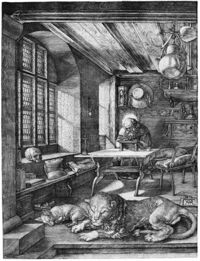Difference between revisions of "Packet study"
Chris Chiego (talk | contribs) |
Kevin Wang (talk | contribs) |
||
| (7 intermediate revisions by 2 users not shown) | |||
| Line 1: | Line 1: | ||
| − | '''Packet study''' is a quizbowl study method that involves reading | + | {{Studying}} |
| + | <onlyinclude> | ||
| + | '''Packet study''' is a quizbowl [[study]] method that involves reading [[packet]]s to learn the [[canon]] of quizbowl as well as specific [[clue]]s for various [[answerline]]s. Since many topics and answerlines recur from tournament to tournament (even though the questions in "[[good quizbowl]]" events are always new at each tournament), reading old packets is an excellent way to learn clues and be alerted to topics that might come up at future [[tournaments]]. | ||
| − | + | The key resource involved is the [[packet archive]], which retains all non-[[NAQT]] sets written since the late 90's, but also useful are the numerous [[question databases]] which allow for search and filtering functionality. The growth of online packet archives has contributed to the popularity of this study method.</onlyinclude> | |
| − | Some players may | + | ==Specifics== |
| + | It is not necessary for players to necessarily learn every clue in a packet. Some players may simply try to learn at least one clue before the point at which they would have buzzed-in during the question if they were listening to it live. Learning every last clue for each question in a packet is most effective in packets of lower difficulty, due to higher rates of recurring clues and [[stock clues|stock]] lead-ins. | ||
| − | + | Some players may print out the packets or use editing software to make notes on each question as they go along. Others may write down specific words or [[clue]]s that they would like to look up more information about later. | |
| + | |||
| + | Players should keep in mind that the packets available online vary considerably in difficulty from tournament-to-tournament. It may be most effective to begin studying with easier tournaments and then gradually start to study more [[Difficulty|difficult]] sets. | ||
[[Category: Quizbowl improvement methods]] | [[Category: Quizbowl improvement methods]] | ||
| + | {{c|Quizbowl lingo}} | ||
| + | {{c|Quizbowl concepts}} | ||
Latest revision as of 08:26, 11 March 2023
Packet study is a quizbowl study method that involves reading packets to learn the canon of quizbowl as well as specific clues for various answerlines. Since many topics and answerlines recur from tournament to tournament (even though the questions in "good quizbowl" events are always new at each tournament), reading old packets is an excellent way to learn clues and be alerted to topics that might come up at future tournaments.
The key resource involved is the packet archive, which retains all non-NAQT sets written since the late 90's, but also useful are the numerous question databases which allow for search and filtering functionality. The growth of online packet archives has contributed to the popularity of this study method.
Specifics
It is not necessary for players to necessarily learn every clue in a packet. Some players may simply try to learn at least one clue before the point at which they would have buzzed-in during the question if they were listening to it live. Learning every last clue for each question in a packet is most effective in packets of lower difficulty, due to higher rates of recurring clues and stock lead-ins.
Some players may print out the packets or use editing software to make notes on each question as they go along. Others may write down specific words or clues that they would like to look up more information about later.
Players should keep in mind that the packets available online vary considerably in difficulty from tournament-to-tournament. It may be most effective to begin studying with easier tournaments and then gradually start to study more difficult sets.
